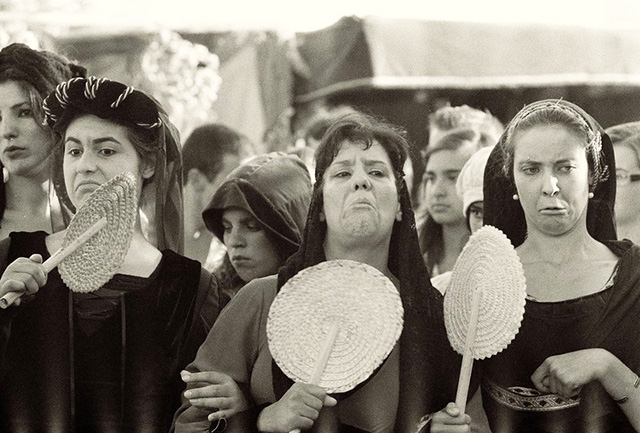Relephant read: I’m not a Single parent—I’m a Lone parent & it’s F*cking hard.
~
I am a lone parent.
When I say that, it’s just a fact. And I’ve noticed that saying it can accidentally trigger the “Mommy Wars.”
The Mommy Wars are emotional battles about how to raise children “best.” Nobody knows how to actually do this, but statements of fact about conditions of motherhood can easily be interpreted to mean that we think our situation is either better or worse than some other parent’s situation.
These statements can trigger a sense of fear and defensiveness that we think we are either superior or need more empathy or compassion than others.
None of this is true.
I don’t mean to trigger the Mommy Wars. I have a child and I raise him alone. It’s not really different than me telling you about my nation of origin or my age. It’s a simple statement of fact, no more or less than saying “I am a stay-at-home mom,” if I was one.
But here’s the thing about the Mommy Wars:
The Mommy Wars are a cultural cry for help. Apparently, given how rampantly these debates sprout up and how impassioned they become—few of us feel supported, heard, or recognized.
Every parent seems to be struggling in their own way and it somehow feels like their voice is lost if someone else’s is heard. We all know “it takes a village,” but it seems like many among us are searching for the town limits, as if we can’t even find the village on the map that was promised to us in the baby books. I guess that must be it.
I’ve considered at length why saying “I have my son 24/7/365” required me to justify that he actually attends school for 22 hours a week between my pick-up and drop-off hours. I factually have him in my presence most of the other 146 hours of the week. When I file my taxes, I do not have to report these missing hours of physicality with my child, but I’ve seen this apparent ”omission” raise ire in Facebook comments, as if it somehow negates that I am a lone parent in the eyes of another mom. It somehow erases a need of being open to receiving a basic understanding of what this experience could entail, let alone having any empathy or compassion for it.
Besides, everyone who knows me in real life knows that my son is my fifth appendage.
When we make statements of context, they don’t need to be statements of superiority. The Mommy Wars are all about scrapping for things that are limitless in this universe: community, humanity, connectedness, understanding. There’s no superiority in these qualities.
I’ve paused to try to understand why saying “I’m a single parent” causes someone to tell me that it’s “better” than having an ex who is inconsistent. I have empathy for this, I have friends who live this life. My statement has nothing to do with comparisons.
Humans naturally set up hierarchies, and there’s no stopping this tendency. But what I find so interesting about the Mommy Wars is that they’re based on a hierarchical power structure, which is a “masculine” energy structure, yet what we are hoping to win by emerging at the top of this battle heap is the “feminine” virtues of love, softness, nurturing, receiving, and/or expressing.
Many among the motherhood tribe have complex situations. This, too, can be cause for judgment. As a response to my recent article on lone parenting, I was asked why I was not married. This same person asked another commenter if she had “even tried” to get a husband. We apparently try to turn the Mommy Wars into moral statements of black and white, good and bad. The reason I am not married is complex and so, too, is the reason I am a lone parent.
None of my single mom friends have black or white paths through parenthood, nor do my married working mom friends or my married stay-at-home-mom friends. Life as a parent is a grey zone.
We could all use some empathy for the complexities of our path, for none of them are easy, and having a stranger stand in judgment to ask why you haven’t taken the black road or the white one belies a sort of shame that you are not pure enough to have done so.
In other areas of life, sharing vulnerabilities is a way to connect and generate community. One of the most powerful ways to create connection and community is through telling stories of the human experience. Yet in the Mommy Wars these can be deemed to be “whining” or an “addiction to sympathy.” I can’t imagine that sharing information about our health conditions would raise the same ire.
We all could use a bit more empathy. I’ve never once in my life met a parent who doesn’t find parenthood challenging, difficult, and trying—at moments. But to get compassion, is it necessary to rip it out of the hands of someone else? Is it necessary to stop listening to their story rather than meeting it with curiosity?
We can all do better, do more, be more heard and seen and understood. We could all share our facts and stories more openly, and listen to the gifts of hearing someone else’s experience. Let your heart or mind or eyes open upon hearing of their experience and asking yourself what it might be like to be in that situation.
What we really do when we engage in the Mommy Wars is bypass our inner child. We bypass the voice inside that says “I want attention” or “I need love” or “I am suffering, please see me.” We were taught somewhere along the way that having this need for softness must be masked and covered up, for it’s dangerous for it to be exposed. We shame ourselves or deny ourselves, and therefore shame and deny others the very thing we want the most.
We want the village that was promised in online articles. We want the community it often seems like “everyone else” has. We want to be understood for our own experience and have some recognition of the complexity, the confusion, and the challenges that parenting inevitably brings. We want to know that this is not easy for anyone else, for this challenge we have is not one we were fully prepared for ourselves. We want our voice to be heard, and often that voice is a collective cry of females saying “this is too much, I am not feeling supported,” for parenting is really the cultural responsibility of women.
We want to trust that this love and compassion and empathy are limitless and that if we give to one, there is more available for someone else.
We want to know that by telling our stories, it does not negate someone else’s. It adds to the voice of the choir.
Mothering is hard. I see you. I acknowledge you. No matter what your conditions are on the path, it is no more or less challenging in the experience you are having.
Mine is one of being a lone parent.
And that’s just a fact.
~







Read 2 comments and reply